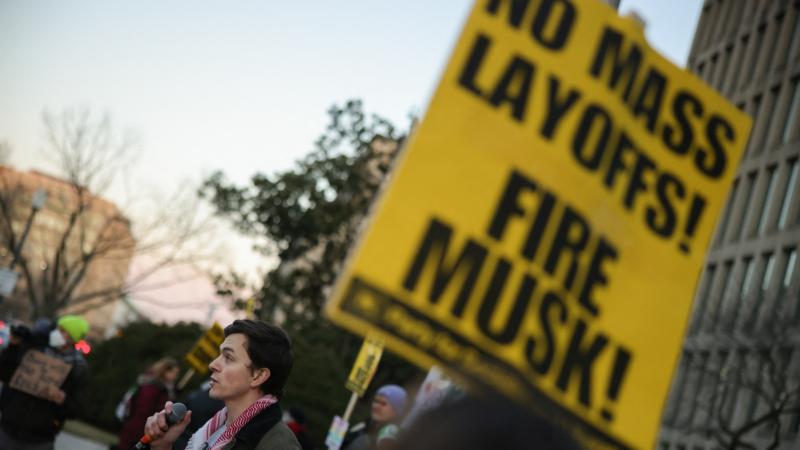‘What did you do last week?’ email stokes confusion and anger among federal workers
A federal government-wide email asking employees “What did you do last week?” plunged workers and agencies into a weekend of confusion and conflicting directives.
Billionaire White House adviser Elon Musk said failure to reply would be taken as resignation. But some department officials told their employees they could hold off on responding.
Adding to the confusion is previous guidance from the Office of Personnel Management (OPM), the agency that sent the broad request, saying that responses to such mass emails were “voluntary.”
Federal workers resurfaced the OPM guidance after they received Saturday’s email, signaling their latest objection to changes pushed by Musk’s Department of Government Efficiency.
Musk teased the OPM notice Saturday afternoon, posting on his social media site X that “all federal employees will shortly receive an email requesting to understand what they got done last week.”
The leader of the DOGE initiative also said “failure to respond will be taken as a resignation.”
Many federal workers are covered by civil service protections that prevent them from being fired without cause, and the actual text of the email sent from an OPM address did not include the ultimatum. Employees were asked to reply with “approx. 5 bullets of what you accomplished last week and cc your manager” by Monday 11:59 p.m. ET.
The brief request would appear counter to a privacy impact assessment OPM published Feb. 5 that said any mass email sent from a government-wide email system would “explicitly” state engaging with the email would be voluntary.
The OPM assessment, published in response to a lawsuit challenging the Trump administration’s implementation of the email system, states seven different times that any response to the mass emails are “voluntary.” The government-wide email system was also used for the “fork in the road” deferred resignation offer.
“The Employee Response Data is explicitly voluntary,” the assessment reads. “The individual federal government employees can opt out simply by not responding to the email.”
The assessment notes that there is a risk that “individuals will not realize their response is voluntary,” a dynamic that quickly played out across the government in the hours after OPM’s Saturday email.
OPM did not immediately respond to NPR’s request for comment on Sunday about whether the email asking workers “What did you do last week?” aligned with the Feb. 5 guidance about voluntary responses.
OPM had said in an earlier statement that the emails are “part of the Trump Administration’s commitment to an efficient and accountable federal workforce,” and that “agencies will determine any next steps.”
Many supervisors and agencies instructed their employees to hold off on responding to the OPM email, according to emails reviewed by NPR, like a directive from new FBI Director Kash Patel that the agency would review its own processes first. The FBI email was confirmed by an individual at the bureau who isn’t authorized to speak publicly.
There are also questions about the legality of the request from OPM, which performs many human resources functions for the federal government.
“The [“What did you do last week?”] email fails to identify any legal authority permitting OPM to demand the requested information,” Everett Kelley, national president of the American Federation of Government Employees, wrote in a letter to OPM’s acting director on Sunday. “OPM’s actions conflict with laws delegating the authority for the management of federal employees to their respective agencies and do not comport with OPM’s own regulations and guidance”
And though Musk wrote on X that responding to the OPM email would be simple and easy, Kelley said in her letter that she has “received numerous reports from dedicated civil servants, including those who care for our veterans and safeguard our nation, expressing frustration over the email’s tone and intent. Rather than fostering professionalism and respect for their work, this hastily written email left many feeling undervalued and intimidated.”
NPR’s Andrea Hsu and Ryan Lucas contributed reporting.
Impostor uses AI to impersonate Rubio and contact foreign and U.S. officials
The State Department is warning U.S. diplomats of attempts to impersonate Secretary of State Marco Rubio and possibly other officials using technology driven by artificial intelligence.
Supreme Court allows Trump to resume mass federal layoffs for now
Justice Ketanji Brown Jackson, who was appointed to the court by President Biden, dissented.
Graphics: Where the Texas floods happened and how high the waters rose
One Guadalupe River gauge near Kerrville and Camp Mystic recorded a rise of more than 25 feet in two hours.
Haiti’s iconic Hotel Oloffson, long a cultural beacon, destroyed by gang violence
The Hotel Oloffson in Haiti's capital Port-au-Prince, long a haven for artists and writers, poets and presidents, a symbol of Haiti's troubled politics and its storied past, has been destroyed by gangs.
New books this week focus on Caitlin Clark, King Tut, and how ‘Democrats Lost America’
Plus: a new novel from Gary Shteyngart, a true story of a shipwreck, and a memoir from a wrongly incarcerated inmate who was exonerated after 28 years behind bars.
Shoes off at the airport? TSA appears to be giving the pesky rule the boot
For nearly twenty years, most air travelers in the U.S. have been required to remove their shoes when going through security. That requirement seems to be ending.








